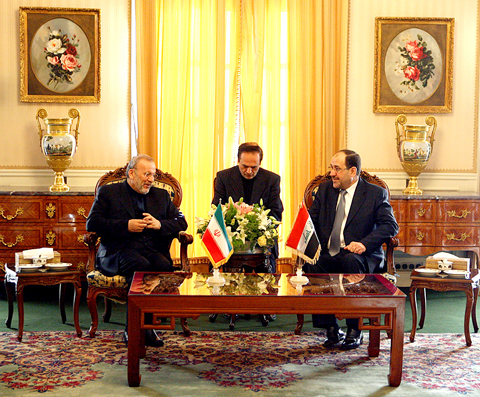Relations between Iraq and Iran are developing in a number of ways, Iraqi Prime Minister Nuri al-Maliki said during a visit to Iran on Saturday.
“The exchange of high ranking visits between the two country’s officials shows that the bilateral relations are developing in different areas,” Maliki said after a meeting with Iran’s first vice-president, Parviz Davoudi, the Iraqi leader’s office said.
Maliki, who arrived on Saturday for a two-day visit, also met Iranian President Mahmoud Ahmadinejad.

Photo: AFP
In the meeting, Ahmadinejad prioritised “regional cooperation to establish security in the region,” state television Web site reported.
“Our Islamic and humane duty requires that we always stand by the Iraqi nation,” he was quoted as saying.
The Iranian president also said that the two countries can “rapidly boost relations and bilateral trade with the wisdom and will of their leaders.”
Maliki was also scheduled to meet with Foreign Minister Manouchehr Mottaki.
Ministerial members of Maliki’s delegation immediately went into talks with their Iranian commerce, power and transportation counterparts, IRNA news agency said.
The two sides agreed to boost bilateral trade from the current level of about US$5 billion, with Maliki urging greater Iranian investment for his war-battered country.
“After elevating security and freeing Iraq from sectarian fighting, it is time to work hard to reconstruct the country and there is a need for companies from neighboring nations to take on reconstruction projects,” Maliki said.
Iran and Shiite-majority Iraq waged a war between 1980 and 1988 in which about 1 million people died but ties have warmed considerably since the overthrow of Saddam Hussein’s Sunni-dominated regime in 2003 by US-led forces.
Maliki’s fourth visit to Iran since he took office in 2006 is his first since the Dec. 14 signing of a bilateral security agreement for US troops to remain in Iraq until the end of 2011 — a deal that irked Tehran.
The Iraqi prime minister’s trip was initially scheduled for late last month.
Meanwhile, US troops have shot and critically wounded a newly wed Iraqi female TV producer after she failed to heed warnings from soldiers in Baghdad, the military and her station said on Saturday.
A US military statement said that Iraqi police and US soldiers had observed the woman, who had had failed to listen to warnings, behaving “erratically” before US soldiers shot her on New Year’s Day.
“Concerned by the danger she might present to the security forces and civilians, given her repeated failure to respond to warnings, multi-national division Baghdad soldiers fired two rounds, wounding the woman,” the statement said.
The incident took place near a checkpoint in the central Baghdad neighborhood of Karrada.
Mohsen al-Darraji, a spokesman for Beladi TV, said that 25-year-old producer Hadeel Emad had failed to heed warning shots because she had impaired hearing.
ATTACK
A female suicide bomber killed at least 35 people and wounded 65 in an attack on pilgrims entering a revered Shiite shrine in northwestern Baghdad yesterday, the Iraqi government said.
The blast struck a checkpoint outside the Imam Moussa al-Kadhim shrine in Kadhimiya, a mainly Shiite area of Baghdad, as Shiites prepared for the Ashura holiday this week marking the death of Hussein, the grandson of the Prophet Mohammed.
Most of the casualties were pilgrims from Iran, security spokesman Major-General Qassim Moussawi said.

In the sweltering streets of Jakarta, buskers carry towering, hollow puppets and pass around a bucket for donations. Now, they fear becoming outlaws. City authorities said they would crack down on use of the sacred ondel-ondel puppets, which can stand as tall as a truck, and they are drafting legislation to remove what they view as a street nuisance. Performances featuring the puppets — originally used by Jakarta’s Betawi people to ward off evil spirits — would be allowed only at set events. The ban could leave many ondel-ondel buskers in Jakarta jobless. “I am confused and anxious. I fear getting raided or even

Kemal Ozdemir looked up at the bare peaks of Mount Cilo in Turkey’s Kurdish majority southeast. “There were glaciers 10 years ago,” he recalled under a cloudless sky. A mountain guide for 15 years, Ozdemir then turned toward the torrent carrying dozens of blocks of ice below a slope covered with grass and rocks — a sign of glacier loss being exacerbated by global warming. “You can see that there are quite a few pieces of glacier in the water right now ... the reason why the waterfalls flow lushly actually shows us how fast the ice is melting,” he said.

Eleven people, including a former minister, were arrested in Serbia on Friday over a train station disaster in which 16 people died. The concrete canopy of the newly renovated station in the northern city of Novi Sad collapsed on Nov. 1, 2024 in a disaster widely blamed on corruption and poor oversight. It sparked a wave of student-led protests and led to the resignation of then-Serbian prime minister Milos Vucevic and the fall of his government. The public prosecutor’s office in Novi Sad opened an investigation into the accident and deaths. In February, the public prosecutor’s office for organized crime opened another probe into

RISING RACISM: A Japanese group called on China to assure safety in the country, while the Chinese embassy in Tokyo urged action against a ‘surge in xenophobia’ A Japanese woman living in China was attacked and injured by a man in a subway station in Suzhou, China, Japanese media said, hours after two Chinese men were seriously injured in violence in Tokyo. The attacks on Thursday raised concern about xenophobic sentiment in China and Japan that have been blamed for assaults in both countries. It was the third attack involving Japanese living in China since last year. In the two previous cases in China, Chinese authorities have insisted they were isolated incidents. Japanese broadcaster NHK did not identify the woman injured in Suzhou by name, but, citing the Japanese